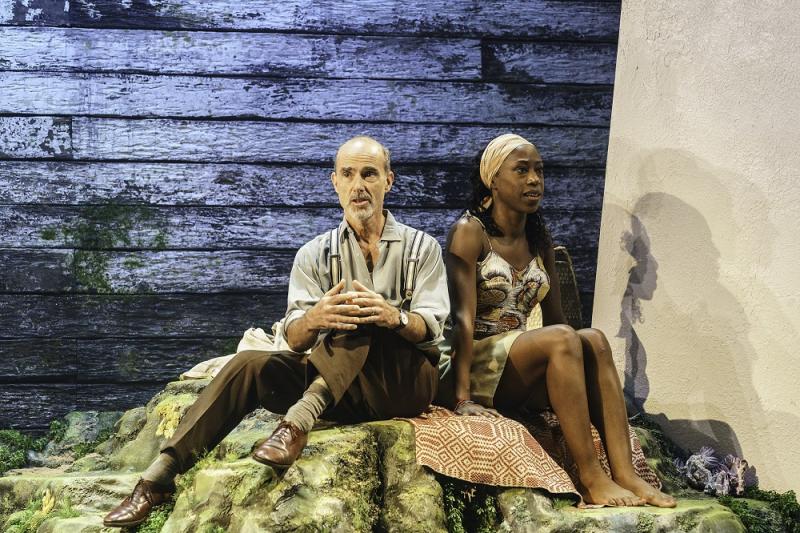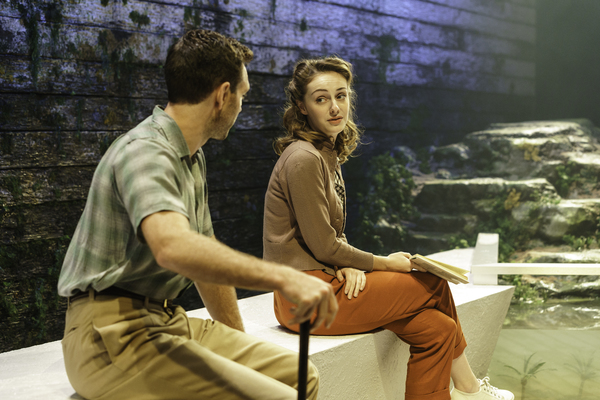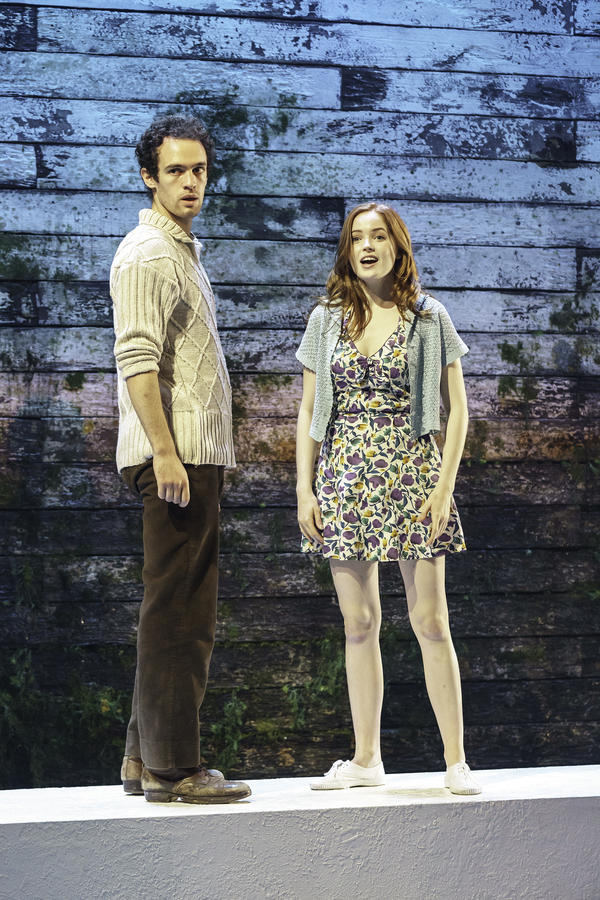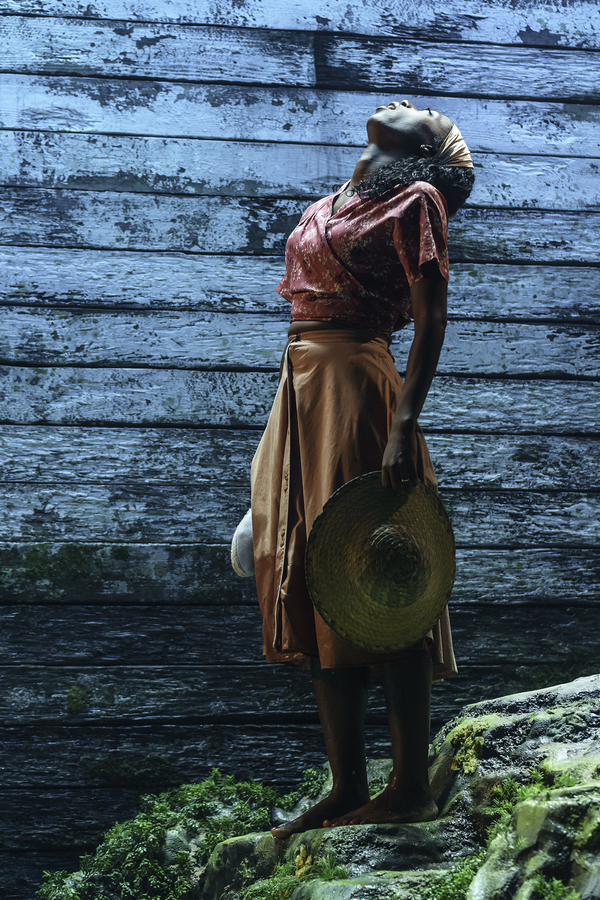The Lady from the Sea, Donmar Warehouse review - Nikki Amuka-Bird luminous in a sympathetic ensemble | reviews, news & interviews
The Lady from the Sea, Donmar Warehouse review - Nikki Amuka-Bird luminous in a sympathetic ensemble
The Lady from the Sea, Donmar Warehouse review - Nikki Amuka-Bird luminous in a sympathetic ensemble
Ibsen's great human comedy weathers a sea-change from fjord to Caribbean island

What a profoundly beautiful play is Ibsen's The Lady from the Sea. It stands in relation to the earlier, relatively confined A Doll’s House, Ghosts and Rosmersholm as Shakespeare's late romances do to the more claustrophobic tragedies. And with what apparent ease, art concealing art, do director Kwame Kwei-Armah, the Young Vic’s next Artistic Director, and the diamantine new performing version by Elinor Cook transport us in the Donmar Warehouse from a Norwegian fjord in the 1880s to the Caribbean of the 1950s.
Nothing is lost of the play's essence, the race issue only brushed in with the lightest of touches to suggest the heroically enduring protagonist’s ties to her village and her role as the lighthouse keeper's daughter, a sudden reversion to the Caribbean accent tellingly placed when she’s under the spell of a not-so-past infatuation. In this setting the three would-be-independent women still have obstacles to overcome, and islanders are perhaps even more susceptible than fjord-folk to the myths and magic of the sea. It's not easy to buy into the melodrama of an uneasily married woman in thrall to the pledge, or curse, forced on her 16-year-old self by a murderous Flying Dutchman. Ibsen, and Cook, get round it through the reasoners of the play questioning its supernatural nature, as do we - and eventually the heroine, too; and they make it subservient to the question of what freedom is, for men as well as women, in relationships and marriage contracts. The symbol of rings that bind and can also be loosened is especially telling. Cook extends its significance magically in an ending that is more poetic than Ibsen’s.
It's not easy to buy into the melodrama of an uneasily married woman in thrall to the pledge, or curse, forced on her 16-year-old self by a murderous Flying Dutchman. Ibsen, and Cook, get round it through the reasoners of the play questioning its supernatural nature, as do we - and eventually the heroine, too; and they make it subservient to the question of what freedom is, for men as well as women, in relationships and marriage contracts. The symbol of rings that bind and can also be loosened is especially telling. Cook extends its significance magically in an ending that is more poetic than Ibsen’s.
Unusually for Ibsen, all the participants other than the Stranger are sympathetic, needing no special light shone on their characters for us to love them. Kwei-Armah's cast make us know who they are as people very quickly, and our attitudes tend to be of smiling complicity rather than the usual Ibsen-induced shock or alarm. Jim Findley's Renaissance man Ballestrad, painting a picture of a half-submerged mermaid which buys into the misogynist nature of such legends, eases us in; Helena Wilson (pictured above with Tom McKay's Arnholm) and Ellie Bamber (pictured below with Jonny Holden), real and recognisable, respectively make us like the capable elder daughter of the widowed and remarried Dr Wangel, Bolette, who’s her own worst enemy, and her stroppy adolescent sister (the name, Hilde Wangel, is of course to take on great significance for Ibsen when she re-emerges in The Master Builder).
 The outsider men are fine-tuned, too. You know immediately what you’re to make of the consumptive young Lyngstrand, a pretentious sculptor doomed to failure if he doesn’t die first, in the physically and vocally note-perfect performance of Jonny Holden; Tom McKay as Arnholm, the girls’ former teacher scarred by the war, is a model of wistful, pained sympathy. Jake Fairbrother as the Stranger seems nominally too young – the big theme is about four characters pushing 40, facing a disillusioned future if they can't relinquish the power of the past – but conveys the necessary power of malice as well as the energy that attracted Ellida to him in the first place.
The outsider men are fine-tuned, too. You know immediately what you’re to make of the consumptive young Lyngstrand, a pretentious sculptor doomed to failure if he doesn’t die first, in the physically and vocally note-perfect performance of Jonny Holden; Tom McKay as Arnholm, the girls’ former teacher scarred by the war, is a model of wistful, pained sympathy. Jake Fairbrother as the Stranger seems nominally too young – the big theme is about four characters pushing 40, facing a disillusioned future if they can't relinquish the power of the past – but conveys the necessary power of malice as well as the energy that attracted Ellida to him in the first place.
Nikki Amuka-Bird (pictured below) refuses to succumb to the this-is-the-star syndrome of previous Ellidas. She’s a team player, reacting vibrantly to everyone around her, but finely draws from her first appearance in the action of the play the nervous volatility that spells out the sea-lady’s weight of inner conflict. The big cries of frustration and alarm are all the more impressive coming from a context that’s believable and real. Finbar Lynch’s Wangel complements her to perfection – a quiet man, good but damaged, whose struggle with giving her the freedom she needs is, like everything else in this production, totally convincing. The denouement can seem glib, but not here, given the hypnotic power of these key interpretations.
 Tom Scutt’s set within the intimacy of the Donmar has the difficult task of conveying both the distant sea and the tree-fringed hilltop residence with its ornamental pond. Instead of going for the realism inherent in Ibsen’s characterisations, he strips the action away to a tank upstage left, with submerged models, slippery rocks above and water into which the two elemental characters half-submerge themselves at judiciously placed moments. The wall at the back, spattered with the mould of the tropics, is superbly transformed by Lee Curran’s lighting in the last act to suggest a sunset at sea. I could have done without any music other than the offstage carnival band that’s demanded by the setting, and the acting is strong enough to carry the weirdness of flashbacks without any need for soundscape underlining, but neither optional extra is too intrusive. What you take away are both lightness and depth, and there could be no greater honour to the balancing act of Ibsen’s great human comedy than that.
Tom Scutt’s set within the intimacy of the Donmar has the difficult task of conveying both the distant sea and the tree-fringed hilltop residence with its ornamental pond. Instead of going for the realism inherent in Ibsen’s characterisations, he strips the action away to a tank upstage left, with submerged models, slippery rocks above and water into which the two elemental characters half-submerge themselves at judiciously placed moments. The wall at the back, spattered with the mould of the tropics, is superbly transformed by Lee Curran’s lighting in the last act to suggest a sunset at sea. I could have done without any music other than the offstage carnival band that’s demanded by the setting, and the acting is strong enough to carry the weirdness of flashbacks without any need for soundscape underlining, but neither optional extra is too intrusive. What you take away are both lightness and depth, and there could be no greater honour to the balancing act of Ibsen’s great human comedy than that.
- Nikki Amuka-Bird interviewed on theartsdesk
- The Lady from the Sea at the Donmar Warehouse until 2 December
- Read more theatre reviews on theartsdesk
Overleaf: more Ibsen on theartsdesk
What a profoundly beautiful play is Ibsen's The Lady from the Sea. It stands in relation to the earlier, relatively confined A Doll’s House, Ghosts and Rosmersholm as Shakespeare's late romances do to the more claustrophobic tragedies. And with what apparent ease, art concealing art, do director Kwame Kwei-Armah, the Young Vic’s next Artistic Director, and the diamantine new performing version by Elinor Cook transport us in the Donmar Warehouse from a Norwegian fjord in the 1880s to the Caribbean of the 1950s.
Nothing is lost of the play's essence, the race issue only brushed in with the lightest of touches to suggest the heroically enduring protagonist’s ties to her village and her role as the lighthouse keeper's daughter, a sudden reversion to the Caribbean accent tellingly placed when she’s under the spell of a not-so-past infatuation. In this setting the three would-be-independent women still have obstacles to overcome, and islanders are perhaps even more susceptible than fjord-folk to the myths and magic of the sea. It's not easy to buy into the melodrama of an uneasily married woman in thrall to the pledge, or curse, forced on her 16-year-old self by a murderous Flying Dutchman. Ibsen, and Cook, get round it through the reasoners of the play questioning its supernatural nature, as do we - and eventually the heroine, too; and they make it subservient to the question of what freedom is, for men as well as women, in relationships and marriage contracts. The symbol of rings that bind and can also be loosened is especially telling. Cook extends its significance magically in an ending that is more poetic than Ibsen’s.
It's not easy to buy into the melodrama of an uneasily married woman in thrall to the pledge, or curse, forced on her 16-year-old self by a murderous Flying Dutchman. Ibsen, and Cook, get round it through the reasoners of the play questioning its supernatural nature, as do we - and eventually the heroine, too; and they make it subservient to the question of what freedom is, for men as well as women, in relationships and marriage contracts. The symbol of rings that bind and can also be loosened is especially telling. Cook extends its significance magically in an ending that is more poetic than Ibsen’s.
Unusually for Ibsen, all the participants other than the Stranger are sympathetic, needing no special light shone on their characters for us to love them. Kwei-Armah's cast make us know who they are as people very quickly, and our attitudes tend to be of smiling complicity rather than the usual Ibsen-induced shock or alarm. Jim Findley's Renaissance man Ballestrad, painting a picture of a half-submerged mermaid which buys into the misogynist nature of such legends, eases us in; Helena Wilson (pictured above with Tom McKay's Arnholm) and Ellie Bamber (pictured below with Jonny Holden), real and recognisable, respectively make us like the capable elder daughter of the widowed and remarried Dr Wangel, Bolette, who’s her own worst enemy, and her stroppy adolescent sister (the name, Hilde Wangel, is of course to take on great significance for Ibsen when she re-emerges in The Master Builder).
 The outsider men are fine-tuned, too. You know immediately what you’re to make of the consumptive young Lyngstrand, a pretentious sculptor doomed to failure if he doesn’t die first, in the physically and vocally note-perfect performance of Jonny Holden; Tom McKay as Arnholm, the girls’ former teacher scarred by the war, is a model of wistful, pained sympathy. Jake Fairbrother as the Stranger seems nominally too young – the big theme is about four characters pushing 40, facing a disillusioned future if they can't relinquish the power of the past – but conveys the necessary power of malice as well as the energy that attracted Ellida to him in the first place.
The outsider men are fine-tuned, too. You know immediately what you’re to make of the consumptive young Lyngstrand, a pretentious sculptor doomed to failure if he doesn’t die first, in the physically and vocally note-perfect performance of Jonny Holden; Tom McKay as Arnholm, the girls’ former teacher scarred by the war, is a model of wistful, pained sympathy. Jake Fairbrother as the Stranger seems nominally too young – the big theme is about four characters pushing 40, facing a disillusioned future if they can't relinquish the power of the past – but conveys the necessary power of malice as well as the energy that attracted Ellida to him in the first place.
Nikki Amuka-Bird (pictured below) refuses to succumb to the this-is-the-star syndrome of previous Ellidas. She’s a team player, reacting vibrantly to everyone around her, but finely draws from her first appearance in the action of the play the nervous volatility that spells out the sea-lady’s weight of inner conflict. The big cries of frustration and alarm are all the more impressive coming from a context that’s believable and real. Finbar Lynch’s Wangel complements her to perfection – a quiet man, good but damaged, whose struggle with giving her the freedom she needs is, like everything else in this production, totally convincing. The denouement can seem glib, but not here, given the hypnotic power of these key interpretations.
 Tom Scutt’s set within the intimacy of the Donmar has the difficult task of conveying both the distant sea and the tree-fringed hilltop residence with its ornamental pond. Instead of going for the realism inherent in Ibsen’s characterisations, he strips the action away to a tank upstage left, with submerged models, slippery rocks above and water into which the two elemental characters half-submerge themselves at judiciously placed moments. The wall at the back, spattered with the mould of the tropics, is superbly transformed by Lee Curran’s lighting in the last act to suggest a sunset at sea. I could have done without any music other than the offstage carnival band that’s demanded by the setting, and the acting is strong enough to carry the weirdness of flashbacks without any need for soundscape underlining, but neither optional extra is too intrusive. What you take away are both lightness and depth, and there could be no greater honour to the balancing act of Ibsen’s great human comedy than that.
Tom Scutt’s set within the intimacy of the Donmar has the difficult task of conveying both the distant sea and the tree-fringed hilltop residence with its ornamental pond. Instead of going for the realism inherent in Ibsen’s characterisations, he strips the action away to a tank upstage left, with submerged models, slippery rocks above and water into which the two elemental characters half-submerge themselves at judiciously placed moments. The wall at the back, spattered with the mould of the tropics, is superbly transformed by Lee Curran’s lighting in the last act to suggest a sunset at sea. I could have done without any music other than the offstage carnival band that’s demanded by the setting, and the acting is strong enough to carry the weirdness of flashbacks without any need for soundscape underlining, but neither optional extra is too intrusive. What you take away are both lightness and depth, and there could be no greater honour to the balancing act of Ibsen’s great human comedy than that.
- Nikki Amuka-Bird interviewed on theartsdesk
- The Lady from the Sea at the Donmar Warehouse until 2 December
- Read more theatre reviews on theartsdesk
Overleaf: more Ibsen on theartsdesk
rating
Explore topics
Share this article
The future of Arts Journalism
You can stop theartsdesk.com closing!
We urgently need financing to survive. Our fundraising drive has thus far raised £49,000 but we need to reach £100,000 or we will be forced to close. Please contribute here: https://gofund.me/c3f6033d
And if you can forward this information to anyone who might assist, we’d be grateful.

Subscribe to theartsdesk.com
Thank you for continuing to read our work on theartsdesk.com. For unlimited access to every article in its entirety, including our archive of more than 15,000 pieces, we're asking for £5 per month or £40 per year. We feel it's a very good deal, and hope you do too.
To take a subscription now simply click here.
And if you're looking for that extra gift for a friend or family member, why not treat them to a theartsdesk.com gift subscription?
more Theatre
 Deaf Republic, Royal Court review - beautiful images, shame about the words
Staging of Ukrainian-American Ilya Kaminsky’s anti-war poems is too meta-theatrical
Deaf Republic, Royal Court review - beautiful images, shame about the words
Staging of Ukrainian-American Ilya Kaminsky’s anti-war poems is too meta-theatrical
 Laura Benanti: Nobody Cares, Underbelly Boulevard Soho review - Tony winner makes charming, cheeky London debut
Broadway's acclaimed Cinderella, Louise, and Amalia reaches Soho for a welcome one-night stand
Laura Benanti: Nobody Cares, Underbelly Boulevard Soho review - Tony winner makes charming, cheeky London debut
Broadway's acclaimed Cinderella, Louise, and Amalia reaches Soho for a welcome one-night stand
 The Pitchfork Disney, King's Head Theatre review - blazing with dark energy
Thrilling revival of Philip Ridley’s cult classic confirms its legendary status
The Pitchfork Disney, King's Head Theatre review - blazing with dark energy
Thrilling revival of Philip Ridley’s cult classic confirms its legendary status
 Born with Teeth, Wyndham's Theatre review - electric sparring match between Shakespeare and Marlowe
Rival Elizabethan playwrights in an up-to-the-minute encounter
Born with Teeth, Wyndham's Theatre review - electric sparring match between Shakespeare and Marlowe
Rival Elizabethan playwrights in an up-to-the-minute encounter
 Interview, Riverside Studios review - old media vs new in sparky scrap between generations
Robert Sean Leonard and Paten Hughes make worthy sparring partners
Interview, Riverside Studios review - old media vs new in sparky scrap between generations
Robert Sean Leonard and Paten Hughes make worthy sparring partners
 Fat Ham, RSC, Stratford review - it's Hamlet Jim, but not as we know it
An entertaining, positive and contemporary blast!
Fat Ham, RSC, Stratford review - it's Hamlet Jim, but not as we know it
An entertaining, positive and contemporary blast!
 Juniper Blood, Donmar Warehouse review - where ideas and ideals rule the roost
Mike Bartlett’s new state-of-the-agricultural-nation play is beautifully performed
Juniper Blood, Donmar Warehouse review - where ideas and ideals rule the roost
Mike Bartlett’s new state-of-the-agricultural-nation play is beautifully performed
 The Gathered Leaves, Park Theatre review - dated script lifted by nuanced characterisation
The actors skilfully evoke the claustrophobia of family members trying to fake togetherness
The Gathered Leaves, Park Theatre review - dated script lifted by nuanced characterisation
The actors skilfully evoke the claustrophobia of family members trying to fake togetherness
 As You Like It: A Radical Retelling, Edinburgh International Festival 2025 review - breathtakingly audacious, deeply shocking
A cunning ruse leaves audiences facing their own privilege and complicity in Cliff Cardinal's bold theatrical creation
As You Like It: A Radical Retelling, Edinburgh International Festival 2025 review - breathtakingly audacious, deeply shocking
A cunning ruse leaves audiences facing their own privilege and complicity in Cliff Cardinal's bold theatrical creation
 Edinburgh Fringe 2025 reviews: Refuse / Terry's / Sugar
A Ukrainian bin man, an unseen used car dealer and every daddy's dream twink in three contrasting Fringe shows
Edinburgh Fringe 2025 reviews: Refuse / Terry's / Sugar
A Ukrainian bin man, an unseen used car dealer and every daddy's dream twink in three contrasting Fringe shows
 Faustus in Africa!, Edinburgh International Festival 2025 review - deeply flawed
Bringing the Faust legend to comment on colonialism produces bewildering results
Faustus in Africa!, Edinburgh International Festival 2025 review - deeply flawed
Bringing the Faust legend to comment on colonialism produces bewildering results
 Edinburgh Fringe 2025 reviews: Imprints / Courier
A slippery show about memory and a rug-pulling Deliveroo comedy in the latest from the Edinburgh Fringe
Edinburgh Fringe 2025 reviews: Imprints / Courier
A slippery show about memory and a rug-pulling Deliveroo comedy in the latest from the Edinburgh Fringe

Add comment